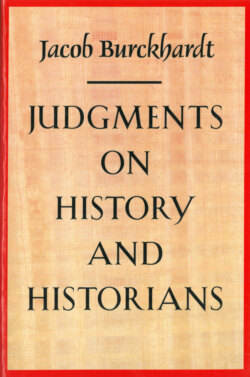Читать книгу JuEAments on History and Historians - Jacob Burckhardt - Страница 7
На сайте Литреса книга снята с продажи.
ОглавлениеTranslator’s Preface
I consider it a privilege to be the translator of a work about which Walter Goetz, the editor of the Propyloäen-Weltgeschichte, wrote: “It is impossible to imagine a more profound introduction to world history and its driving forces.”
Jacob Burckhardt’s Historische Fragmente were selected by Emil Dürr from Burckhardt’s lecture notes for his history courses at the University of Basel during the period from 1865 to 1885. The Fragmente, which were first published in 1929 as Volume Seven of Burckhardt’s Collected Works, may be regarded as a companion volume to his Weltgeschichtliche Betrachtungen (published in English as Force and Freedom) [and in 1979 as Reflections on History, by Liberty Fund—publisher’s note]. The present translation is based on the edition issued in 1942 by Benno Schwabe, Basel, and the Deutsche Verlagsanstalt, Stuttgart. It has been checked against the virtually unchanged new edition issued by the K. F. Koehler Verlag of Stuttgart at the end of 1957.
The very qualities that make Burckhardt’s work so unique and attractive, even exasperatingly charming—the tone of improvisation; the compressed, elliptical style, by turns professorial and colloquial; the occasional contradictions and ambiguities; the abrupt shifts—also provide a real challenge to the translator. Burckhardt wrote in the rather austere Swiss German of the nineteenth century, and his language, moreover, seems to reflect his personal willfulness, his sharp criticism of his time. Within the limits of reasonably clear and idiomatic English I have tried to reproduce some of Burckhardt’s stylistic peculiarities. His emphases and question marks as well as other evidences of his erudite musings have been faithfully retained throughout; a few factual inaccuracies have been corrected. Since this edition is intended for the general reader interested in history as well as for the specialist, it was decided to omit most of the critical and bibliographical apparatus of the German edition, which consists in large part of specific information about Burckhardt’s various manuscripts, variant readings, and passages later deleted by Burckhardt himself. Wherever possible, those footnotes of the German edition that were deemed essential have been incorporated into the text, but minutiae and bibliographical references to works not readily accessible today have generally been omitted in an effort to promote continuity and readability.
I should like to express my appreciation to Philip Rieff, Janet Finnie, John Rackliffe, Paul Alexander, and John Wight for their helpful interest in this work. The last-named kindly supplied the translations from the Greek and Latin. Katharine McCagg was good enough to compile the Index.
H. Z.
